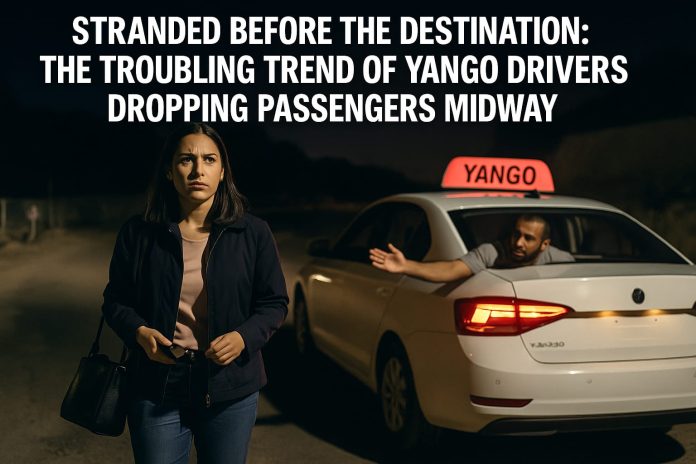By Fiza Zahid
ISLAMABAD, Jun 15 (APP): Yango, once welcomed as a cheaper, more convenient alternative in Pakistan’s crowded ride-hailing scene, the service now faces growing backlash over poor safety standards, unreliable vehicles, and an increasingly frustrating user experience.
But Yango’s swift fall from grace within two years’ time span isn’t new. From Careem and Uber to Bykea, InDriver, Swvl and a few more, Pakistan has seen one ride-hailing service after another enter with bold promises, only to repeat the same cycle. Each begins by undercutting the market with low fares and big claims. Then come the price hikes, driver disputes, app glitches, and safety concerns.
“A ride-hailing user Raniya Imran while speaking to APP sharing her experience said, “Most alarmingly, women continue to face the worst of these issues report being dropped far from their destinations by Yango without explanation. These mid-ride abandonments, paired with run-down vehicles are growing safety threats that demand immediate attention from both the company and regulators.”
“Where I wanted to go was just 10 minutes away,” says regular user Laiba Amjed. “But the driver took wrong turns and got us stuck in traffic for over an hour. He blamed me, demanded extra money, and even after I paid, said it wasn’t enough.” Although I was refunded after complaining, no action was taken against him, leaving him free to repeat this with others,” she remarked.
These cases are becoming more common, especially among women, who report being misled, overcharged, or abandoned in unsafe areas.
“The app doesn’t offer a choice of nearby drivers, instead, it assigns just one and makes you wait, forcing you to accept it. This lack of options, combined with poor communication and slow app response, only adds to the frustration and delays.” Laiba Amjad talking to this scribe shared an even more troubling experience when a driver ignored her directions and left her at deserted road under construction, far from her destination. “It was terrifying in the darkness of night,” she recalled.
From the drivers’ perspective, the situation has its own complications. Many Yango drivers cite the app’s strict penalties, poor income structure, and long working hours as reasons for frustration. They argue that some fares are so low they can’t even cover fuel costs, especially during long detours or traffic delays.
Hammad, a Yango driver, says, “We aren’t trying to abandon passengers, but when a 30-minute drive in heavy traffic earns only Rs. 300, it feels unfair. Still, that’s no excuse to leave someone stranded, especially in a dangerous spot. The real issue is many drivers are untrained and overwhelmed.”
Another passenger, Hassan Syed recounted a troubling experience with a vehicle that appeared barely roadworthy. “The moment I stepped in, the car made loud, threatening noises, it felt like it might collapse in the middle of the road,” he said. “It was some 35-year-old poor Suzuki Mehran. How do such vehicles even get registered with a service like Yango? There should be a proper inspection before these cars are allowed on the road.”
Similarly, Saba a working woman who daily commutes from Islamabad’s G-13 sector to Zero Point with her two-year-old son, described her ordeal. “I booked a comfort AC ride to ensure a cool journey for my child in scorching heat, but the driver was irritable and only turned on the AC after I insisted, only to find it wasn’t working at all. I paid for comfort but got worse than a regular taxi. “There should be a quick and effective way to file complaints and get results,” she said with frustration.
To address these growing concerns, ride-hailing services like Yango must strengthen driver screening, ensure proper training, and enforce strict penalties for misconduct. Real-time support systems, such as emergency buttons and live assistance, must also function reliably when passengers need them most. While fair compensation for drivers is important, it should never come at the cost of passenger safety.
Yango declined to respond to public complaints or address issues raised by their drivers when approached for comments.




